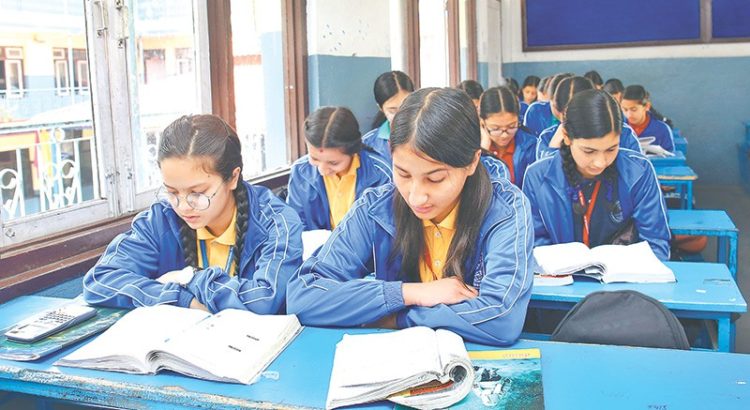By Binod Ghimire
Sep 28, 2018-Two days after the federal parliament endorsed the Act on Compulsory and Free Education, Private and Boarding Schools’ Organisation Nepal (PABSON) slammed the provisions in the new law that increases the share of scholarship they must offer students. The umbrella body of private schools has issued a deadline for the government to amend the provision or face protests.
Earlier this month, the new education law had increased the share of scholarship to 15 percent from the existing 10 percent through a unanimous vote in both the Houses of Parliament. The Ministry of Education, the line ministry which had drafted the Act, has yet to respond to PABSON’s threat to boycott the law.
Although the ministry has been monitoring the private schools and prepared an annual report on institutions that charge exorbitant fees, the government has not taken any action against a single private school that has violated the rules.
In 2011, the government had introduced 5 percent tax to the private schools, which was later revoked when PABSON refused to honour it. The organisation has also rejected the 2012 Supreme Court order imposing a moratorium on fee increment for three years. Education experts say that the organisation’s past behaviour and their continued dismissal of government regulations show how the private education sector has become increasingly powerful just as their numbers—both in terms of schools and student enrolment—continue to go up.
The government, which had nationalised all community and private schools in 1971, reversed its course nine years later in 1980 and even opened the door to for-profit schools for the first time. The expansion of private schools has been going on unabated since.
Today, private schools occupy about 19 percent of share in the country’s education system. A recent economic survey by the Ministry of Finance shows that out of the total 35,601 schools in the country, 6,566 are privately owned. In the last six years, there has been nearly 5 percent increase in the number of private schools across the country—and it continues to rise despite the country’s adoption of a new constitution that ensures free school education to every Nepali citizen.
“I thought the government, through the Compulsory and Free Education Act, would take some measures towards containing the growth of private schools and promoting the public schools,” said Binaya Kusiyat, a professor at the Tribhuvan University and an independent researcher. “Allowing private schools to function as they have been for all these years is making a mockery of the socialism-oriented constitution.”
Kusiyat said his study shows that the entire school education can be made free even if the government allocates the budget as per its global commitment. Currently, the education sector receives around Rs125 billion annually, which is just 10 percent of national budget against the global commitment of 20 percent. It is an international benchmark to allocate 20 percent of country’s national budget or around 6 percent of the GDP for the education sector.
Education experts say it is ironic that capitalist countries have a minimal presence of the private schools while a country like Nepal, which is led by a socialist or a communist party, has become a fertile ground for commercialising education.
According to a 2015 report by the Organisation for Economic Cooperation and Development (OECD), which compiles educational data from a majority of nations across the globe each year, less than 9 percent students from the United States attend private schools. The number is even lower in New Zealand, Canada, and the United Kingdom, where the share of private schools is just 6 percent.
Countries like Finland, Norway, and Singapore, whose school education is considered among the best in the world, have about three percent private schools.
“The number of students going to private schools is decreasing in capitalist countries but it’s exactly opposite in ours,” Kedar Bhakta Mathema, education expert and former vice-chancellor of the Tribhuvan University, told the Post. “We were very optimistic that the country would change. But the present developments do not give us much hope.” Mathema said there is no enthusiasm in the governing officials to improve the public education system, which means they are directly and indirectly promoting the private sector.
Mathema also alluded to the fact that there is little chance the government will take any strong measures to control the haphazard expansion of private schools because many political leaders—and their families—are involved in running these schools. Around 45 members of the second Constituent Assembly were directly involved in running private schools or colleges. In the current federal parliament, there are about two dozen lawmakers who own and run private education institutions.
Earlier this year, Man Prasad Wagle, an education expert and professor at the Kathmandu University, presented a report suggesting that the government should gradually phase out private schools while facilitating a shift towards technical education or university education. The suggestion made public in April said the phasing out process should start from the first grade, which will take 12 years to end the private sectors’ presence in the education sector.
Education Minister Giriraj Mani Pokharel, who comes from the ruling Nepal Communist Party, said the government is not in a position to take ownership of the entire education system because it simply does not have the budget.
“We cannot ignore the contribution of the private sector,” Pokharel told the Post during an interaction last week. “Both private and public schools can go hand in hand and complement each other.”
Source of the article: http://kathmandupost.ekantipur.com/news/2018-09-28/defying-rules-private-schools-dominate-national-education.html







 Users Today : 73
Users Today : 73 Total Users : 35459668
Total Users : 35459668 Views Today : 144
Views Today : 144 Total views : 3418116
Total views : 3418116